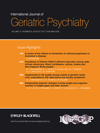Change in cognitive functioning in depressed older adults following treatment with sertraline or nortriptyline
Abstract
Objective
The aim of this study was to compare the impact of nortriptyline to sertraline on change in cognitive functioning in depressed older adults.
Methods
We used pre–post neuropsychological data collected as part of a 12-week medication trial comparing sertraline to nortriptyline in the treatment of older adults with non-psychotic, unipolar major depression to examine change in cognitive functioning. Neuropsychological assessments included mental status (Mini-Mental Status Exam), psychomotor speed (Purdue Pegboard), attention (Continuous Performance Test, Trail Making Test A), executive functioning (Stroop Color/word Test, Trail Making Test B), and memory (Buschke Selective Reminding Test).
Results
Within treatment groups, patients treated with sertraline improved only on verbal learning. This change did not depend on responder status. Between treatment groups, patients treated with sertraline improved more in verbal learning compared with patients treated with nortriptyline. Looking at change in cognition as a function of medication condition and responder status revealed that sertraline responders improved more in verbal learning compared with nortriptyline responders but not more than sertraline non-responders or nortriptyline non-responders. Nortriptyline responders were the only treatment by responder status group to show no improvement in verbal learning from baseline to endpoint.
Conclusions
Unexpectedly, nortriptyline responders showed no improvement in verbal learning as compared with patients treated with sertraline or nortriptyline non-responders. However, given the small sample sizes and number of statistical tests (potential for type 1 error), replication is warranted. Copyright © 2011 John Wiley & Sons, Ltd.




